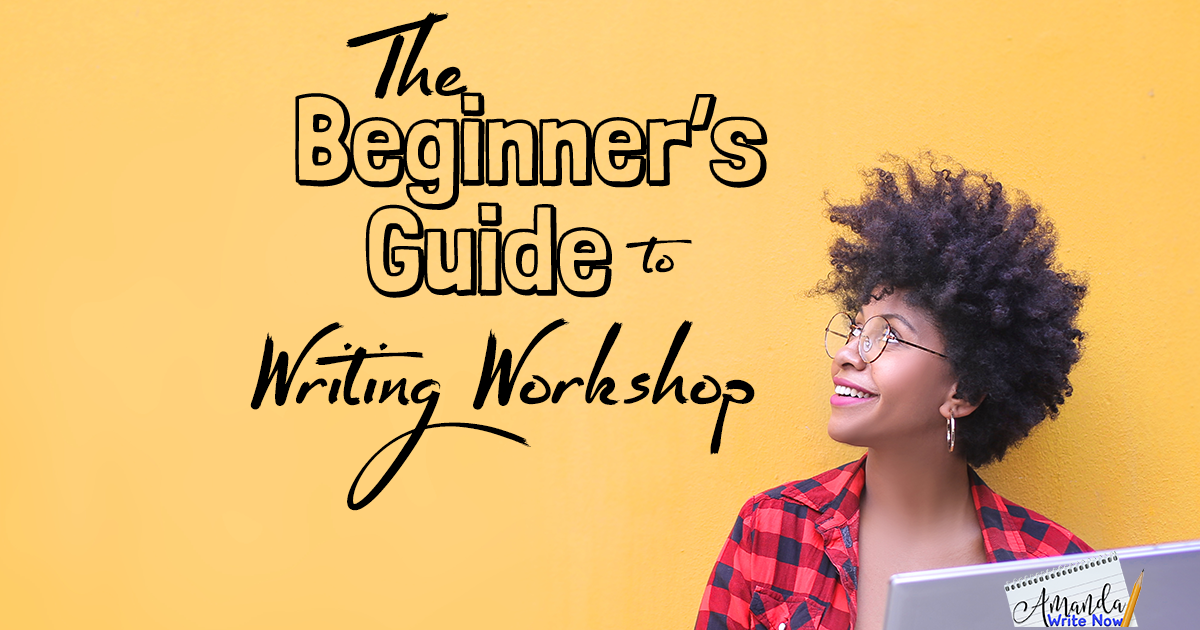
Many secondary teachers, like you, are beginning to realize the power of running their English classes using writing workshop. Maybe you keep seeing references to it on Pinterest or in Facebook groups. Maybe a teacher friend is trying it and finding success. Or maybe an administrator is pushing teachers at your school to try it. Whatever your reason for being here, this article can help you get started!
Writing workshop is a very simple and predictable system that splits your writing time into three components: the mini lesson, writing time and share time.
The mini lesson is a quick (10 minutes max) direct instruction lesson given by the teacher. Writing time is a time for students to write and for the teacher to support students by having conferences. Conferring with students is a bit challenging and takes a lot of energy so it can be skipped if you are just beginning.
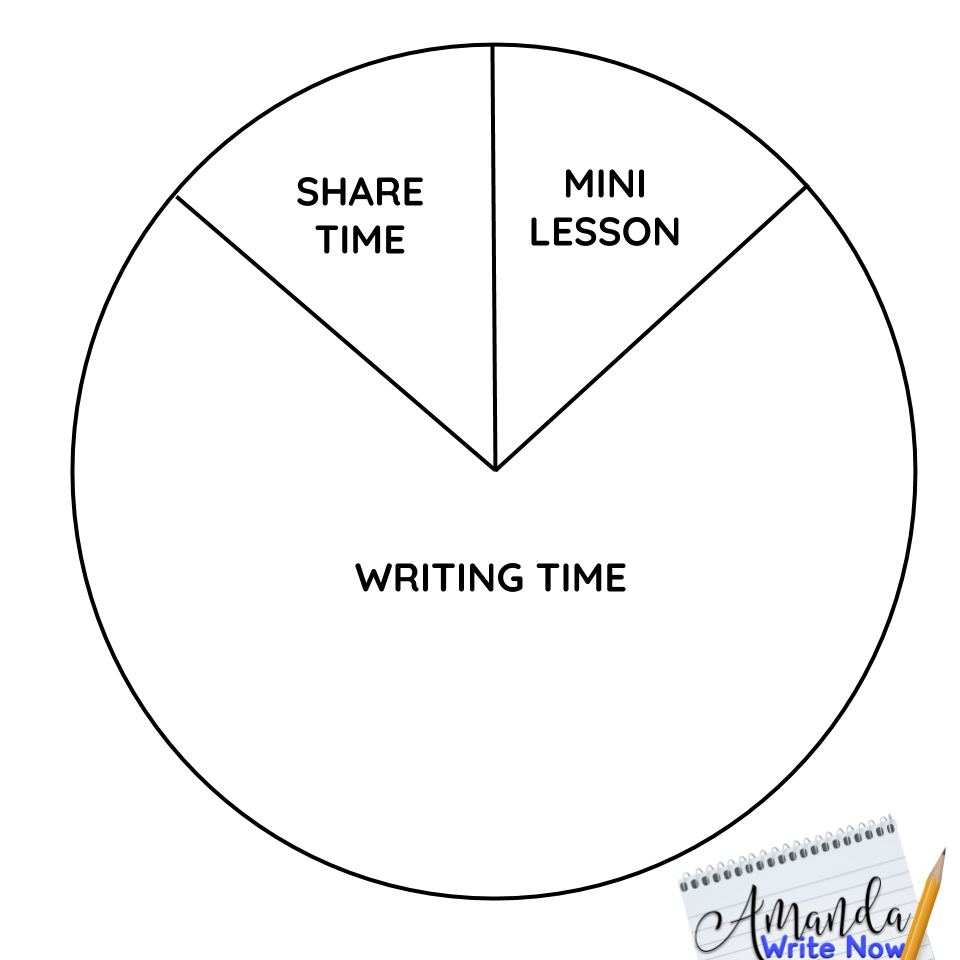
Share time is an opportunity for students to share their writing or reflect on their progress and goals as writers. There are other components like mentor texts, charts and notebooks but I’ll get to that in a bit.
How Can I Get Started?
I recommend trying workshop one day a week to start. On Monday explain to students that for one day a week (maybe Fridays) your class will be trying a new program called writing workshop. You’ll want to practice the routines of writing workshop before the day you launch it. Show students the pie chart schedule above and practice each component before your launch day. It may take a couple weeks of practice before students are ready to start.
What Do I Need?
You really don’t need much to run a writing workshop program. Below I’ve listed things you should think about organizing before getting started.
A Meeting Area
This is where students will come during your mini lesson. This does not have to be anything fancy. I tell students who are sitting close to the whiteboard and projector to stay at their desks and students who are far away to come sit on a small carpet space in the front of the room. Students can even sit on top of desks or counters. Be creative about your space even if it is super small, some sort of transition is important.
Some of you may wonder what the point of a meeting area is, I know I did for a long time. Telling students to come to the meeting area is signaling to them that what you have to say is so important that they need to come closer. It is also just really nice to have students close so that you can quickly redirect attention and get students on task. It also incorporates movement into your class period, which many students need.
Mentor Texts
Mentor texts are examples of the type of writing your students will soon be writing. So, if your students are going to write poems, then your mentor texts should be poems. If they are writing informationally, then the mentor texts should be information articles.
It is critical that you pick one main mentor text to build your mini lesson from and read it with students before your mini lessons. The reason is so that students are familiar with the whole text and so are better able to apply the skills you are teaching when they reread with you during your mini lessons. You should also have other mentor texts that students can refer to during practice time. Here are some resources for where to find these mentor texts and how to use them..
- 10 Places to Find Mentor Texts
- Middle School Mentor Texts by Genre
- Teach Students HOW to Use Mentor Texts
Writing Notebooks
Students need a place to brainstorm, draft and take notes about your mini lessons. The teacher also needs a notebook to brainstorm and draft in front of students. Some of your mini lessons could revolve around you just writing and struggling in front of students. Try not to micromanage these notebooks. I don’t do page numbers, a table of contents. Students should be able to personalize their notebooks. They can choose to create a table contents if they want to, but I don’t require it. I keep it simple: class notes in the front, brainstorms and drafts in the back.
Choice Charts
We don’t want to just send students off by saying, write! This can be a little too overwhelming for them. I’ve made this mistake before and it can really lead to an unproductive class. Instead, give students options in the form of a choice chart. You’ll also want to give options for students who…
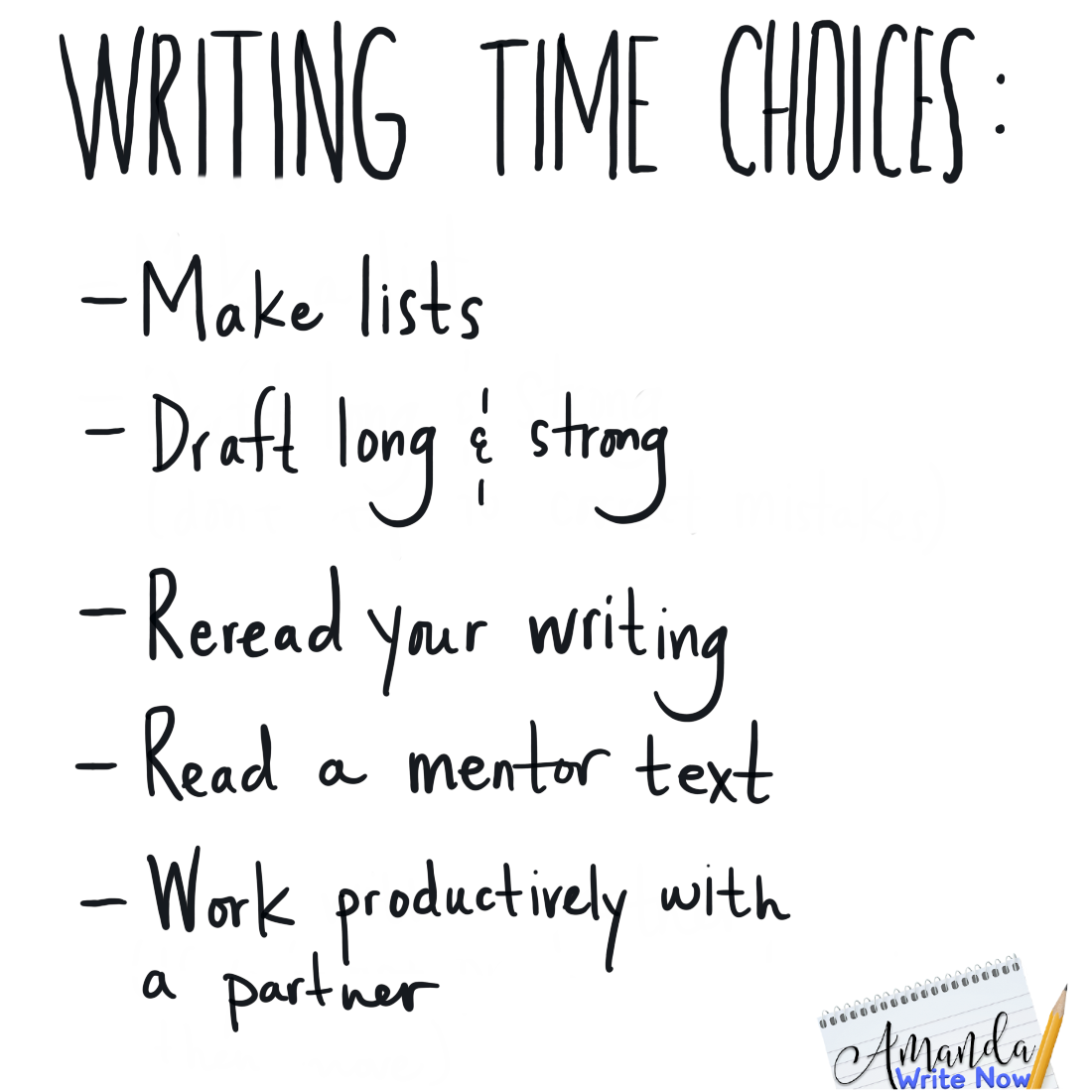
Anchor Charts
An anchor chart will guide your whole writing unit. This is where you will list all the skills you teach students throughout your unit. I urge my students to draw pictures and write what is on the anchor chart in their own words. I also like to start some days with students reviewing what they learned the day before using the anchor chart. Here is a link to lots and lots of charts you can use for many purposes.
Assessment Tools
During every mini lesson I refer directly to a single-point rubric. I have moved away from complicated rubrics and toward single-point rubrics for three reasons. 1. They are so simple for teachers to use when assessing students’ writing. 2. they are easy to understand for students. 3. they help me plan my writing unit and individual mini lessons. Here is an example of a single-point rubric to teach literary essay writing…
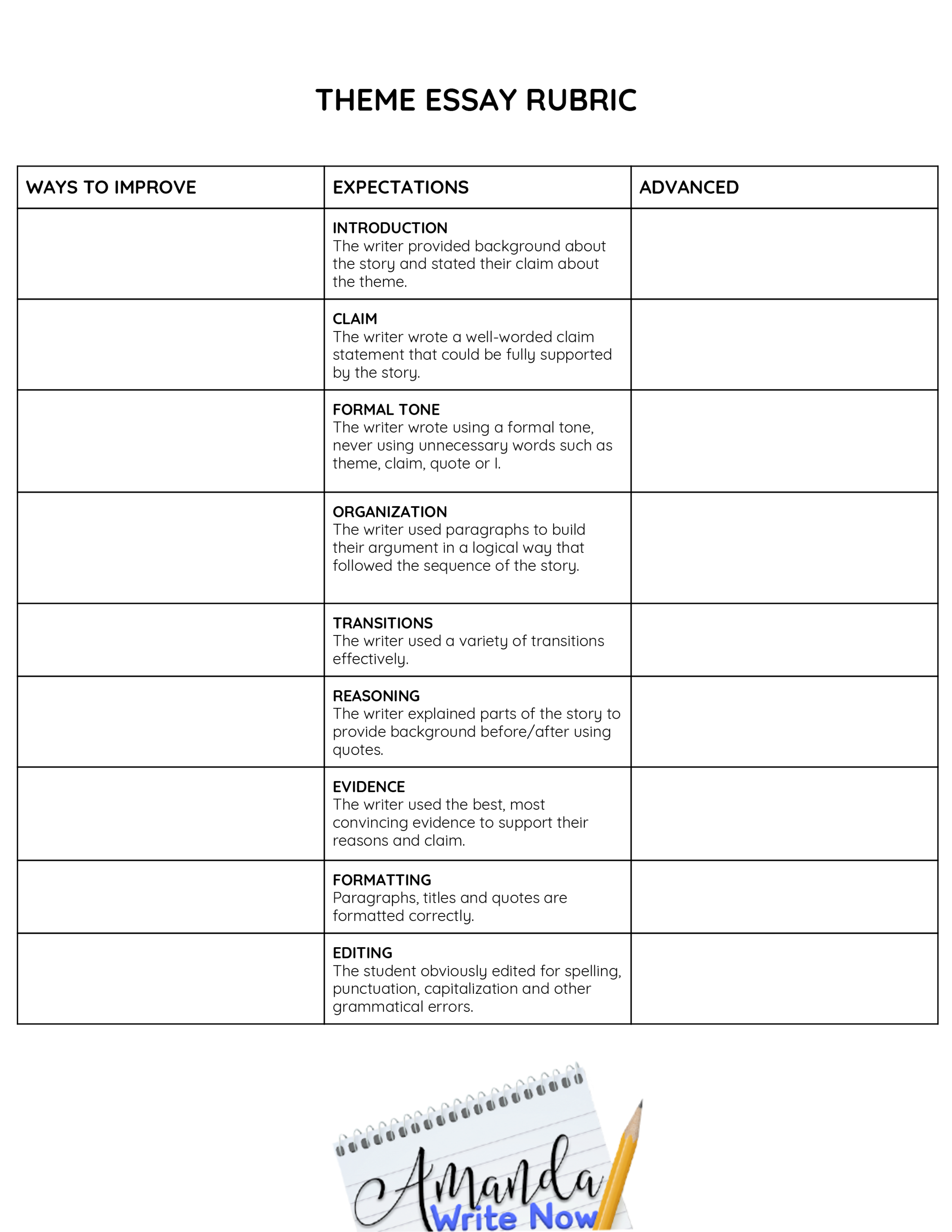
How Do I Plan Mini Lessons?
Your mini lessons should be based on the skills you have listed on your rubric. I always start with the vocabulary I want students to learn and apply in their writing: Narrative Vocabulary, Information Vocabulary, Argument Vocabulary. All of my mini lessons follow the exact same format:
- Hook-a meme, a story from my life, a reference to pop culture, or an opportunity for students to talk to each other about something related to the lesson
- Teaching Point-state exactly what you are about to teach as concisely as possible
- Model-show student the writing skill in action either in a mentor text or by writing in front of them
- Practice-have students practice using the skill in their notebooks or by talking to a partner or someone sitting next to them
Where Can I Find Mini Lessons?
I have a plethora of free and paid mini lesson resources right here on this this website for you! Check them out…
- Mini Lessons
- 5 Must Teach Mini Lessons
- Narrative Mini Lessons
- Fiction Mini Lessons
- Information Mini Lessons
- Argumentative Mini Lessons
How Do I Plan Units?
My writing units are different every year. They are different because I have different students every year and I need to adapt what I teach to their needs. I go through a very specific series of steps when planning my units. Here are the steps:
- Choose a genre of writing (narrative, memoir, fiction, poetry, info, argument etc.)
- Give an on demand assessment (students have one hour) using a writing prompt, such as…”Today I want you to share your opinion on a topic you care about. In your introduction tell me about the topic and your opinion. In your supporting paragraphs, provide at least three reasons for your opinion with evidence you find from the internet. You may want to do a little research at home tonight and have some articles in mind that you’ll refer to in your opinion paper. This is graded on completion NOT skill. I want to see what you can do before I start teaching our opinion writing unit. I will base my lessons on skills I notice you need after doing this assessment.”
- Skim the on demand assessments and write down skills I notice students are lacking.
- Create my single-point rubric using the skills I notice students need.
- Find mentor texts that best demonstrate those skills.
- Begin writing my own piece to discover common struggles of this type of writing. Add more mini lessons.
- Read one mentor text out loud to students. This will be the mentor text I refer to throughout the unit in my mini lessons.
- Find videos, pictures, charts, memes, graphic organizers etc. that might help students with these skills.
- Type up an anchor chart using my single-point rubric.
- Begin the unit and teaching mini lessons!
It may seem like a complicated process but it really isn’t so bad once you get started. Here’s a video that may help.
How Do I Publish Writing?
Don’t feel like you need to publish your students’ writing after every unit. I recommend trying it one time your first year. There are many, many ways to do this. There are some very simple ways to publish student writing and other more complicated and advanced ways. When you are starting out, just giving students a chance to share with their peers, is just fine. Having your writing read by an audience is very rewarding (and sometimes embarrassing) for students. Here are 10 Ways to Publish Student Writing. Pick what works for you and your students!
What Problems Might I Run Into?
Writing workshop is so effective. But it’s not easy. Here are some links to articles I’ve written about common hurdles you may face with writing workshop and and how to overcome them.
- My Students Don’t Writing During Writing
- I Don’t Know How to Confer
- My Students Don’t Know How to Research
- 10 Ways to Make Writing Assessment Easier
Other Questions?
I love hearing from teachers who are just beginning to learn about the world of workshop and teachers who have been doing this for years! For teachers who are new to this…after reading this article what questions do you still have about how to run a successful workshop program? For teachers who have been doing this awhile…what other suggestions or tips do you have? Feel free to comment below!
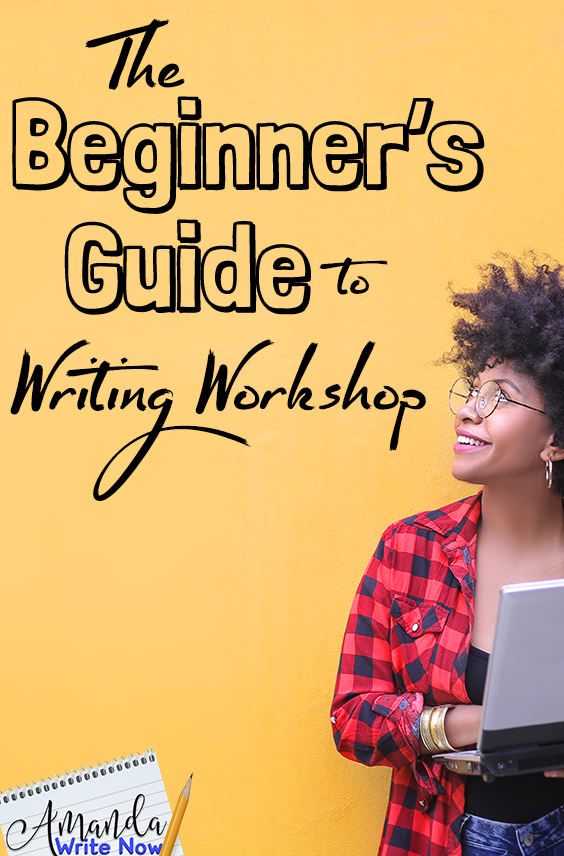
0 Comments